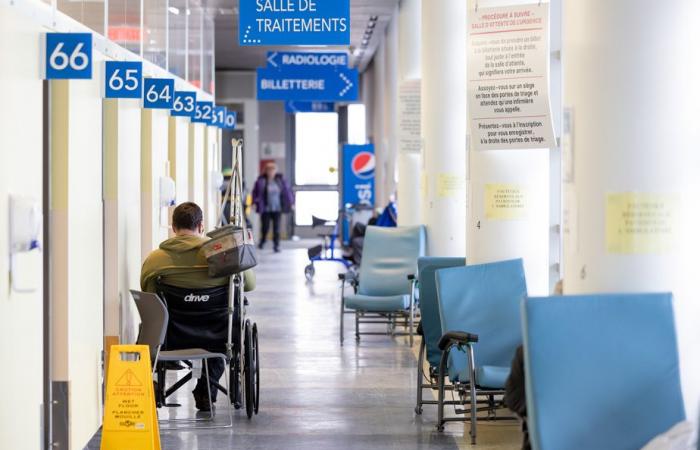The health system must revolve less around the hospital and instead strengthen local services, concludes the transition committee which guides Santé Québec in the transformation of the network. But the path will be strewn with pitfalls, reveals a report obtained by The Press.
Published at 5:00 a.m.
A “critical turning point”
The creation of Santé Québec represents a “historic opportunity to transform the system”, while the health and social services network finds itself at a “critical turning point”, writes the transition committee in its final report, which we were able to to consult. This first “road map” towards the “culture change” promised by Christian Dubé was transmitted to the minister by the big boss of the state company, Geneviève Biron, and the Deputy Minister of Health, Daniel Paré.
“The pandemic shock has amplified the structural difficulties of recent years and has exacerbated tensions which can no longer be ignored,” writes the committee made up of around fifteen people, including emergency physician Gilbert Boucher, the former CEO of the CHU Sainte-Justine Caroline Barbir, representatives of the regions and users.
They cite “constant pressure” due to “an aging population and inequities in access.” A change is necessary “to meet the expectations of the population and ensure the sustainability of the system”, we warn.
Getting away from the hospital
The transition committee recommends an in-depth review of ways of doing things by moving away from the hospital-centric model to develop a value-oriented system. It is a scientifically validated approach that integrates “principles of accessibility, equity, quality and humanity”. In short, this means bringing services closer to the user, giving them a say and decentralizing decision-making. We measure care based on its quality (value), not just its volume.
The committee notes that across the world, health systems are facing an “unprecedented cost explosion” due to a shortage of workers and an aging population. “Value-based health systems address these concerns […] by emphasizing results that matter more to users in relation to the costs required to achieve the desired results,” we write.
Santé Québec is also launching its operations in a difficult budgetary context, since it must make cuts of $1.5 billion. In 2022, after her investigation into the management of the pandemic, the Commissioner of Health and Well-being recommended that Quebec develop a plan to implement a value-based network. Joanne Castonguay is an observer member of the transition committee.
Many pitfalls
There will be many pitfalls in bringing about this change, believes the transition committee, which carried out a “critical analysis” of the “structural and operational challenges” facing the system. The committee, which began its work last year, identified a dozen obstacles to transformation in the current state of things. Here are some observations:
- A “significant gap” in data collection and use
- “Local successes are rarely shared”
- “Systemic, financial, communicational and cultural barriers limit equitable access to care”
- The “current conditions are not favorable to active mobilization” of staff
- A “lack of regional and local flexibility (or lack of room for maneuver)” to adjust the organization of care
- The absence of “a minimum offer of local services defined and known within each region”
- A complex governance structure and decision-making processes
In addition, we note that “the system is currently marked by inconsistencies”, while “the current structure is built on the provision of care”, and not on the needs of citizens. The performance of the network is evaluated according to the number of interventions and the number of users served, rather than overall health, it is emphasized.
User voice and proximity
The transition committee makes 12 recommendations to the Minister of Health to support his vision. We note that citizens “often feel that their participation in decisions that concern them is limited to the role of user or beneficiary”, whereas the current system is “eminently focused on the professionalism of the people who work there” and that those -they “struggle to consider the preferences and lived experience of people”.
However, in a value-driven model, “the citizen perspective is essential” to decision-making, we write. We recommend “deploying an approach and mechanisms” that integrate the point of view of users, patients and citizens. The committee also asks to ensure “simplified, equitable and timely access to a range of local services”, that is to say in CLSCs or family medicine groups (GMF), for example.
It is also necessary to “consolidate and adapt local governance structures”. We want to collaborate with local partners such as community organizations and cities to act “upstream of health problems” and respond in a “more targeted manner to the needs of communities”.
The favorable minister
PHOTO FRANÇOIS ROY, LA PRESSE ARCHIVES
The Minister of Health, Christian Roy
The Minister of Health supports the adoption of a value-based care model. This is “an avenue that we are already looking into to offer ever more humane and more efficient care,” writes Christian Dubé’s office. This approach, “which responds in particular to the challenges of the aging population, will be essential to ensure the sustainability and effectiveness of the health system,” we write.
Mr. Dubé adds that Santé Québec “will be responsible for implementing” this model at the operational level over the coming years. For its part, the state corporation thanks the transition committee for its work. “ [Ses] recommendations will play an important role in the creation of our strategic planning, which must be unveiled in March,” indicates spokesperson Jean-Nicolas Aubé.
To prevent its report from being relegated to oblivion, the transition committee proposes the creation of a position of “great guardian of the prioritization of strategic initiatives” which would ensure the implementation of the network transformation roadmap and should be held accountable in this regard. This senior manager could support the number 2 at Santé Québec, Frédéric Abergel.







